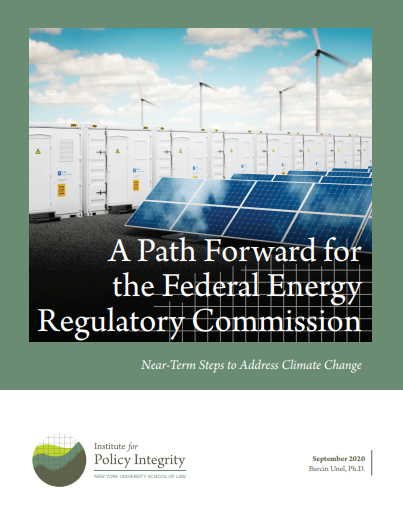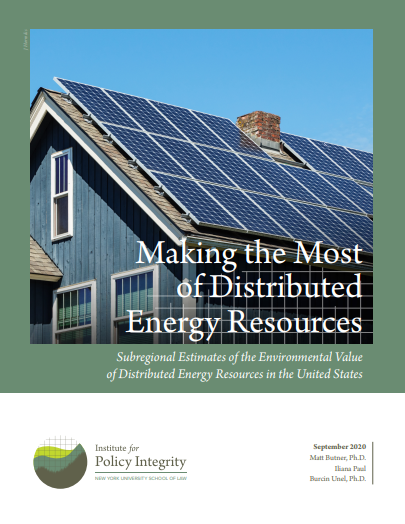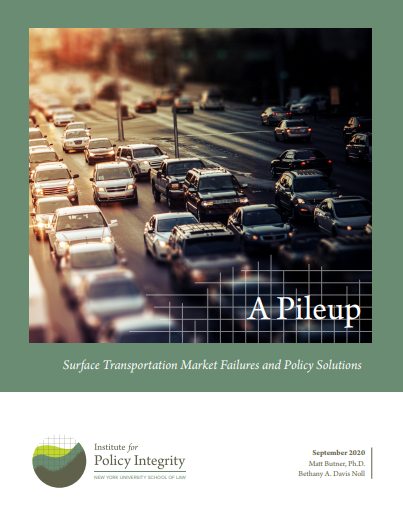-
Comments to Department of Labor on Shareholder Proxy Voting Rule
A rule proposed by the Department of Labor would limit the shareholder rights of Employee Retirement Income Security Act (ERISA) participants. The rule, in particular, would eliminate opportunities for ERISA fiduciaries to vote on Environmental, Social, and Governance (ESG) proposals that have long-term financial benefits for retirements plans. We worked with the Environmental Defense Fund to submit comments detailing the flaws of the Department’s rule.
-
A Path Forward for the Federal Energy Regulatory Commission
Near-Term Steps to Address Climate Change
The Federal Energy Regulatory Commission should take an active role in better aligning regulatory practices with climate policies, speeding up development of necessary transmission infrastructure, and reforming energy market rules. This report details the specific policy reforms that federal policymakers should pursue to take advantage of important opportunities energy markets can provide to combat climate change while ensuring an economically efficient and speedy clean energy transition.
-
Amicus Brief in SDNY on Healthcare Nondiscrimination Rule
A rule by the Department of Health and Human Services would narrow the scope of civil rights protections for patients under the Affordable Care Act. We filed an amicus brief in the U.S. District Court for the Southern District of New York explaining how HHS fails to acknowledge, let alone weigh, the significant social harms resulting from the rule.
-
Making the Most of Distributed Energy Resources
Subregional Estimates of the Environmental Value of Distributed Energy Resources in the United States
This report provides a new set of hourly E-Values for the whole United States, broken down into 19 subregions, using an open-source reduced-order dispatch model. The patterns uncovered by these estimates can help policymakers design economically efficient DER policies to reduce air pollution from electricity generators.
-
A Pileup
Surface Transportation Market Failures and Policy Solutions
Surface transportation market failures, including greenhouse gas emissions, local air pollution, traffic congestion, and traffic collisions, generate billions of dollars in economic harm every year. Guided by economic principles, this report outlines several options for reforming U.S. surface transportation that account for technological, institutional, and political realities. It also highlights the unequal burden of market failures in the transportation sector and discusses policy solutions that can help lead to more just outcomes.
-
Comments to DOE on Energy Conservation Analysis for Air Conditioners
The Department of Energy (DOE) requested input on the analytical framework, models, and tools that it is using to evaluate potential standards for room air conditioners. In the technical support document, DOE departs from recent practice by proposing to focus on the domestic-only “interim” social cost of greenhouse gases estimates. We submitted joint comments recommending that DOE should, as it has in the past, continue to monetize the full climate benefits of greenhouse gas emissions reductions, using the best available estimates, which were derived by the Interagency Working Group on the Social Cost of Greenhouse Gases.
-
Comments to FERC on PennEast Amendment Project
The PennEast 2020 Amendment Project, which provides for various additions to the proposed PennEast pipeline, would result in significant greenhouse gas emissions. We submitted comments on the Federal Energy Regulatory Commissions’s draft environmental assessment of the project, which fails to meaningfully assess the impact of emissions using social cost of carbon metrics.
-
Comments to DOE on Energy Storage Systems
The Department of Energy (DOE) recently requested input on its Energy Storage Grand Challenge, which is a program aimed at expanding the development and proliferation of energy storage systems in the U.S. electric power system. We submitted comments explaining what tools and policies are necessary to ensure that energy storage systems are accurately valued and can participate fully in the market.
-
Comments to EPA on Proposed Dust-Lead Pollution Rules
The Environmental Protection Agency (EPA) proposed revisions to dust-lead post-abatement clearance levels. We submitted comments emphasizing how EPA, itself, concedes that the economic analysis supporting the rule is inaccurate.
-
Comments to the New York PSC on Resource Adequacy
The Brattle Group developed a resource adequacy scenario analysis for the New York Public Service Commission (PSC), which is considering how to best meet its electricity generating capacity and resource adequacy needs. We submitted comments encouraging the PSC to consider several questions that Brattle’s analysis does not examine in depth.











